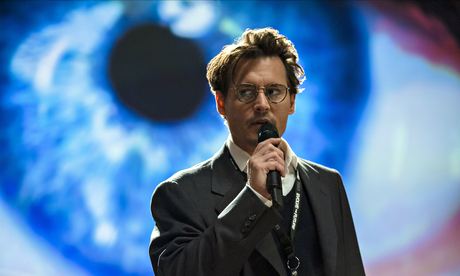
Even if real life mirrored science fiction and we could predict the future, it would have taken a pretty sophisticated bit of kit to have nailed the emergence of Wally Pfister's Transcendence as one of 2014's bigger critical turkeys. Christopher Nolan's cinematographer lined up a sumptuous cast including Johnny Depp, Rebecca Hall, Paul Bettany, Morgan Freeman and Kate Mara for his directorial debut. Jack Paglen's script, about the revival of a dead artificial-intelligence researcher, Will Caster (Depp), as an apparently omnipotent digital version of his former self, made the 2012 Black List of the best unproduced screenplays in Hollywood. Trailers so far have suggested an intriguing fate-of-humanity thriller with shades of The Terminator, Watchmen and The Matrix. But early reviews are in, and they are almost universally damning. Critics say the film fails to balance its credentials as a thinkpiece with the need to appeal to mainstream audiences, and ends up failing on both fronts.
"There are intriguing, half-formed ideas afoot in Transcendence, but the script and Pfister's heavy, humourless direction tend to reduce everything to simplistic standoffs between good and evil – or, in this case, heartless technocrats and crunchy-granola resistance fighters," writes Variety's Scott Foundas. "The bigger problem is that all the characters on both sides are so uniformly bland and lifeless that one can hardly tell the flesh-and-blood humans from the army of man/machine 'hybrids' Will begins assembling with his suddenly infinite powers."
"Alas, amidst the struggle between the script's compelling high-mindedness and the package's conventional commercial requirements, there is a blurring of intent and, with that, a loss of a vital emotional connection to any of the three characters," says the Hollywood Reporter's Todd McCarthy. "One is forced to conclude that, to make a film as intellectually adventurous as Transcendence wants to be, a film-maker is almost obliged to work as independently – and cheaply – as, say, Shane Carruth did on Upstream Color."
Indiewire's Eric Kohn calls Transcendence a "messy, confused melodrama", adding: "It has the atmosphere of a film noir but the tempo of an espionage movie without doing justice to either tradition." Michael Phillips of the Chicago Tribune says the film "offers roughly the same level of excitement as listening to hold music during a call to tech support".
There is praise for Pfister's cinematography from HitFix's Drew McWeeny, but only by way of contrast with the film's "dumb" script. Spoiler-phobes might want to avoid that particular review, because McWeeny really does manage to give away pretty much the film's entire plot.
The Guardian's Tom Shone is in agreement with most critics, calling Transcendence a "sleek but insubstantial sci-fi thriller". He opines: "It's the old story, I'm afraid: the essential boringness of omnipotence as a plot device. Depp is believable enough in his early scenes, if a little checked-out – he gets one nice bit of topspin on a line about the techno-terrorism being light on logic, but not irony – but the moment he uploads, the life seems to go out of him and the movie."
Does Transcendence's apparent failure really tell us that "big idea" science fiction should remain in the indie domain? (Is this why Alien is a better movie than Prometheus?) If so, that's a pretty depressing development. Perhaps it's just that this particular concept has been done to death on the big screen. After all, Nolan proved with the more leftfield Inception that mapping out the logical ramifications of far-out futuristic technologies can make for kinetic storytelling that perfectly fits the demands of high-octane cinema.
If watching Johnny Depp's journey towards becoming a virtual god is about as exciting as learning to code HTML5, what ideas should film-makers be exploring? Micro-drones? Military mind control? The exploration of the vast reaches of space? Or is mainstream sci-fi really best off plumping for simple space-opera storylines that better fit the form?

